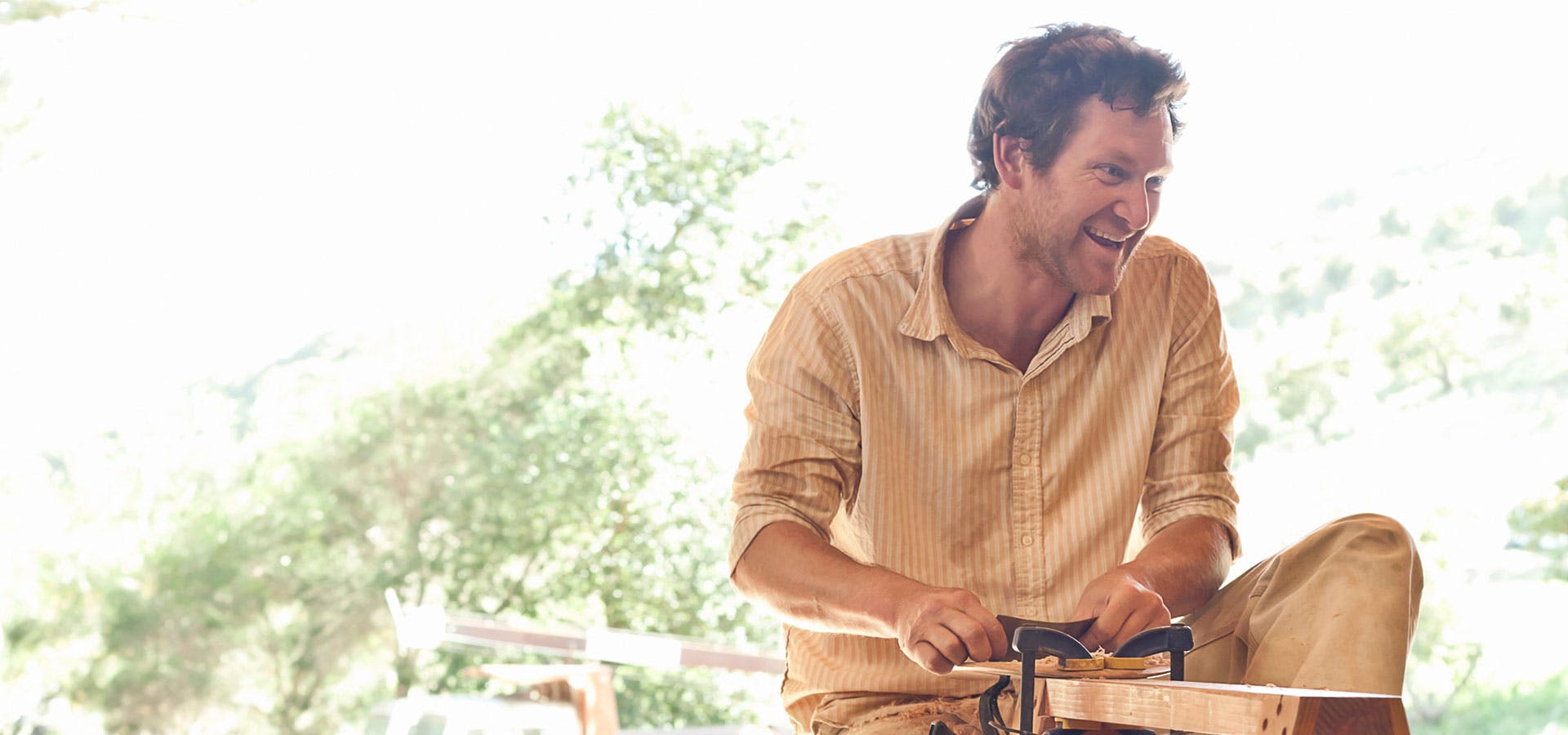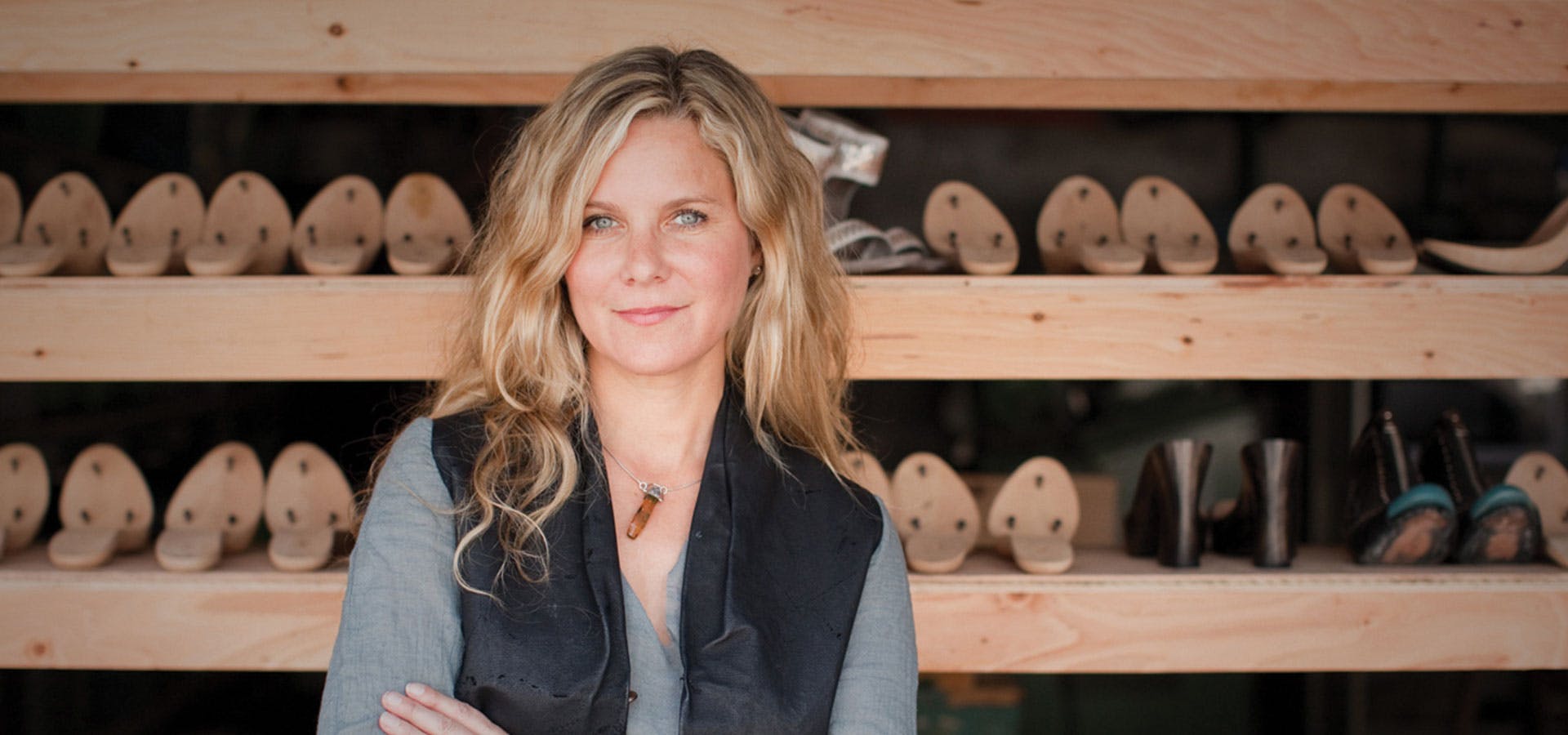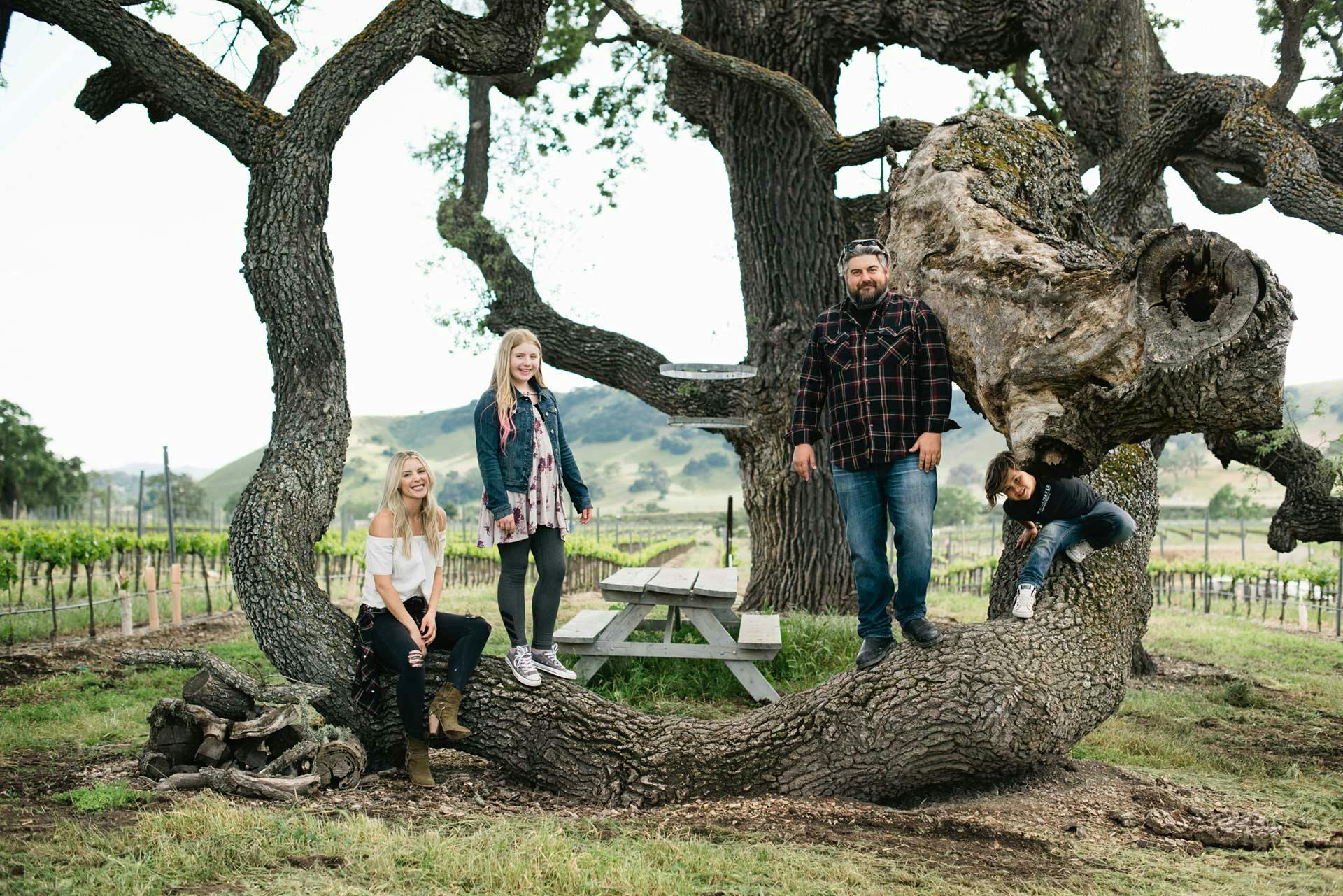Dave Hall has never flown an airplane and doesn’t have his pilot’s license. But spend a few minutes with the cofounder of El Segundo–based company MotoArt, and you’d never know it. For the Palos Verdes High School graduate who launched the company in 2001 with business partner and friend Donovan Fell, life revolves around everything from fuselages and fuel tanks to propellers and wing flaps.
“Everyone asks me if I fly, and I don’t,” says Dave, who along with Donovan initially started creating and conceiving ideas for functional furniture designs crafted from retired commercial and military airplane remnants in his former garage in Palos Verdes. “I always say that there’s something fascinating about aviation. But what little boy doesn’t ‘fly’ around his room with his arms out? Growing up, I always loved making models. My whole room was filled with airplane models.”
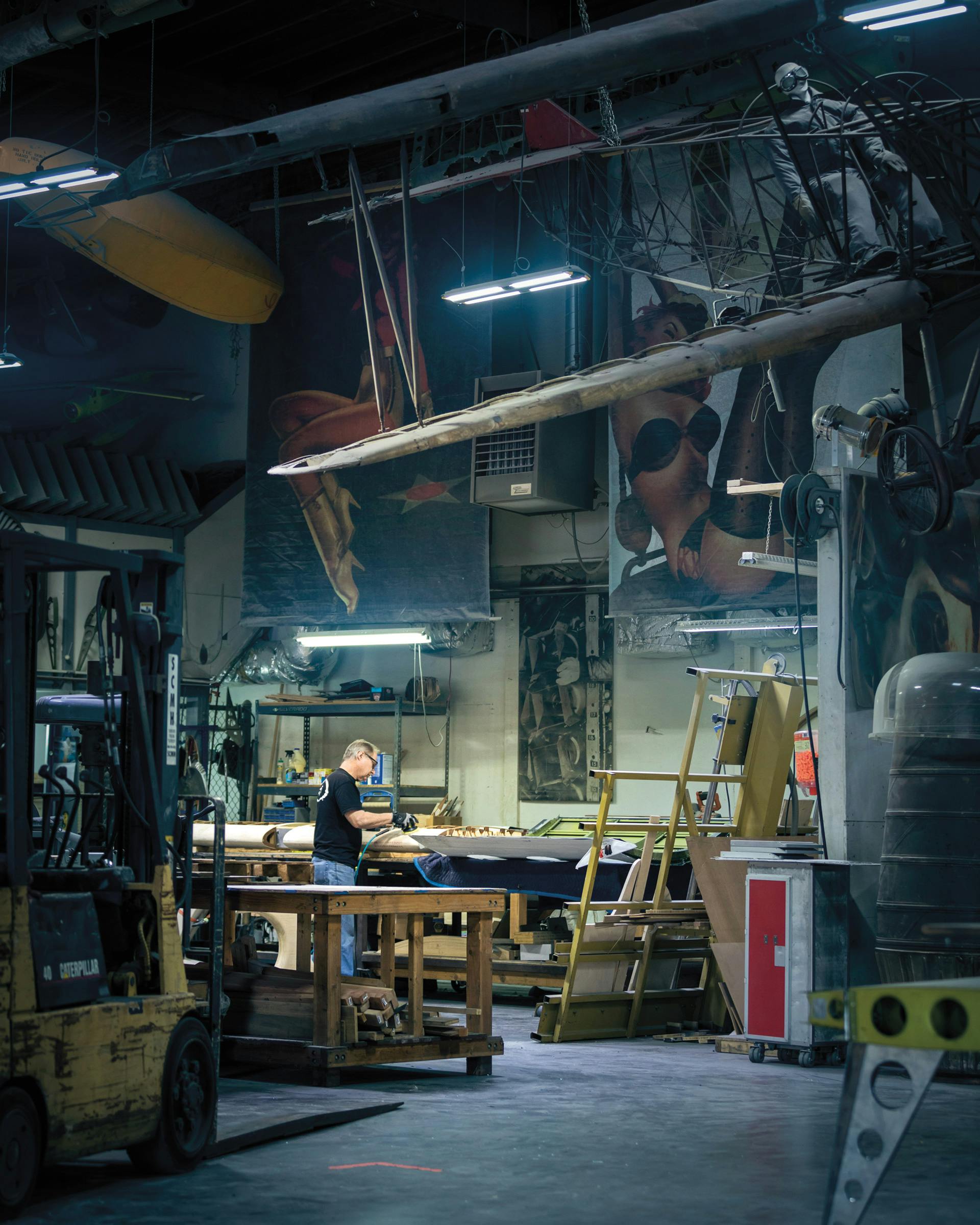
Standing in an expansive, 18,000-square-foot warehouse-gone-museum and workroom, it’s hard not to stare. “There’s a lot of history here, and every piece has a story,” says Dave, of the company with dealer showrooms in Maryland, Sydney, China and the Czech Republic. “It’s super-clean in here, and an interesting little side gig for us is that we’re known for our holiday parties. So about two years ago we started doing private events here for Northrop Grumman, SpaceX, Hilton hotels, bar mitzvahs. You name it, we’ve had those types of parties.”
A DC-6 airplane (once used by The Monkees for touring in 1967) hangs from the ceiling, while old business class seats anchor the entrance to the warehouse, a mounted DC-3 nose hangs above the workshop and a rare F-86 Sabre culled from the Pima Air & Space Museum resides outside in the yard. Dave pulls out a book of custom guitar designs for Fender’s Stratocaster (not yet in production) topped with B-25 airplane skin.
There’s not much MotoArt isn’t making—including a Boeing 747 jumbo jet conference table with internal LED lighting and half round tempered glass top that fetches $35,000; a Boeing 737 fuselage on casters that doubles as a partition; a C-124 cargo bed with original tie-down rings and a leather upholstered footboard; and a B-52 bomber flap conference table priced at $75,000.
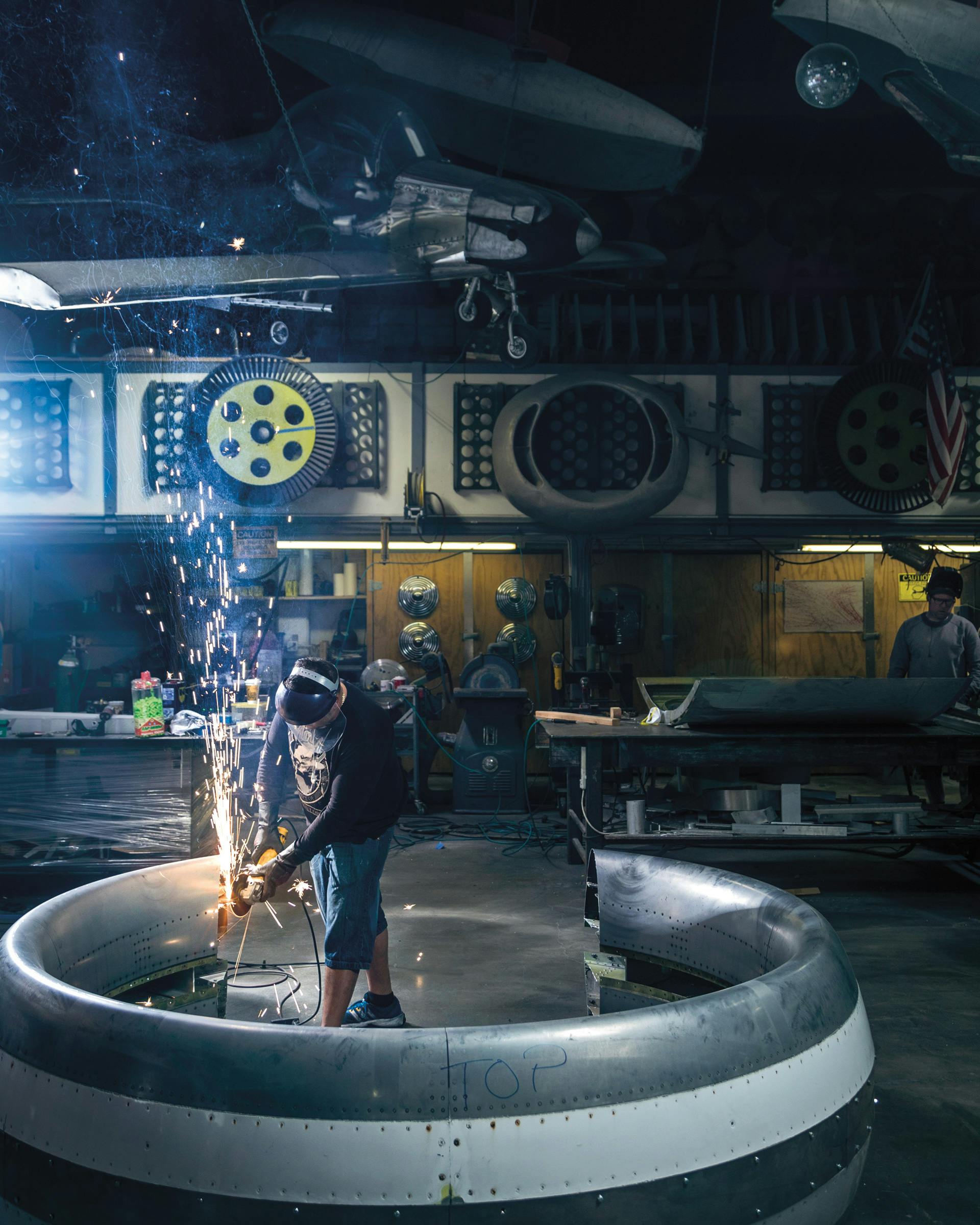
“Everything we build is really authentic,” adds Dave, revealing that they have a large yard with stored aircraft in Palmdale. “The only thing that we really kind of reproduce are what we call the Stearman. You can see what the old wooden wings looked like [points above], and they weren’t strong enough to support the glass, so we started replacing with new wings.”
Walking through the busy warehouse with polishing and sanding machines going at full speed, Dave points to some of the work in progress including a fuselage bench with an upholstered seat for a restaurant on the East Coast and two 747 cells for an entryway piece lined with lights for an office building.
“Our clients are aerospace, production companies, law firms,” explains Dave, pointing to the ceiling. “Here we have all of our antique air frames. We have DC-3, and DC-4s and WWII B-25 parts and F80s. This is really where all our money is at. But what we get a lot of today is commercial aircraft like the 737s, the 747s and the stuff we fly on today. We look high and low to find the antique stuff, and we pay a premium for it. We’ve gotten parts from Thailand, Florida and Alaska.”
As we continue the tour, Dave gestures to other rare artifacts, such as a WWI Fokker they uncovered in a barn in Van Nuys. “It’s not every day that you find a Fokker,” he says.
Dave consulted with a curator from Evergreen Aviation & Space Museum, who laboriously inspected and assessed the plane and discovered that it was used in the war film Hell’s Angels directed by Howard Hughes, and also a British Nat wing. “I think that’s why the events are so special, because it’s literally like a museum here now with what we’ve designed.”
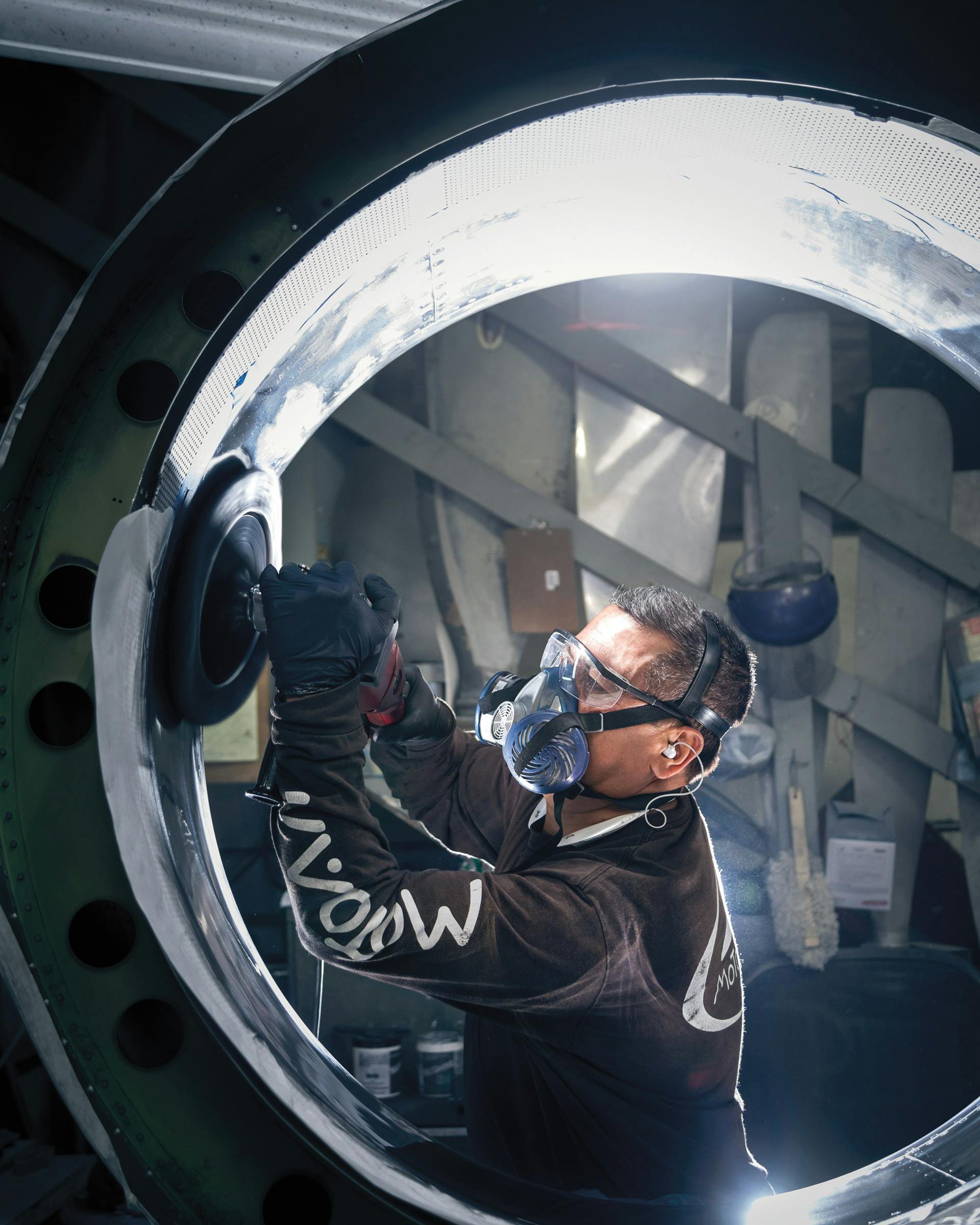
Taking Flight
Dave, who grew up helping his father in the petroleum industry designing gas stations and fuel tanks, admits he gained strong skills in sales and marketing through that experience. “I got the entrepreneur bug from my father,” he explains. “I was kind of aimless and didn’t know what I wanted to do, but I knew I was good at sales and marketing.”
Through an ad in the Los Angeles Business Journal, he found a job making signs at American West Signs (where he first met Donovan) for clients such as Dodger Stadium, Disneyland and Universal Studios. “I’ve never taken an art class in my life, and now I’m giving art lectures,” says Dave, who worked there for eight years and now gives annual Art vs. Commerce lectures at Art Center in Pasadena and Otis College. “I didn’t know a thing about signs, but Donovan and I became like ‘the duo.’”
As a side job, Dave was exhibiting a salvaged propeller-turned-sculpture dating to WWII at the Rose Bowl Swap Meet (priced at $1,500). When it sold, he thought he might be on to something, and they ultimately bought eight propellers and decided to debut them at a Barrett-Jackson show in Scottsdale, Arizona.
“Everyone thought we were building an airplane in my garage,” laughs Dave, who used money from his own home as an investment in the business. He began sanding and transforming the pieces into functional art. They sold all eight at the show, but an unexpected car fire on the road trip back destroyed all of the pieces. They had to start from scratch.
Over breakfast, they jotted notes on designs they envisioned. “It was a very rough beginning and it’s been a long road, but now we’re known all over the world and giving these pieces a second life. I love making people go, ‘Wow!’”
Long hours also meant traveling the globe and visiting domestic “boneyards” in Roswell, New Mexico, the Mojave Desert and Goodyear, Arizona. But post-9/11, it’s much tougher to get coveted pieces from military aircraft—with the government ban on the sale of retired military planes.
“We do a lot with fuselage windows because with all of these aircraft retiring, it’s really the one common denominator of something that we have a lot of. We have an endless supply of windows,” says Dave. “We make picture frames out of them, beds, conference tables, desks, couches, coffee tables … and it has a very distinctive look that everyone kind of recognizes.”
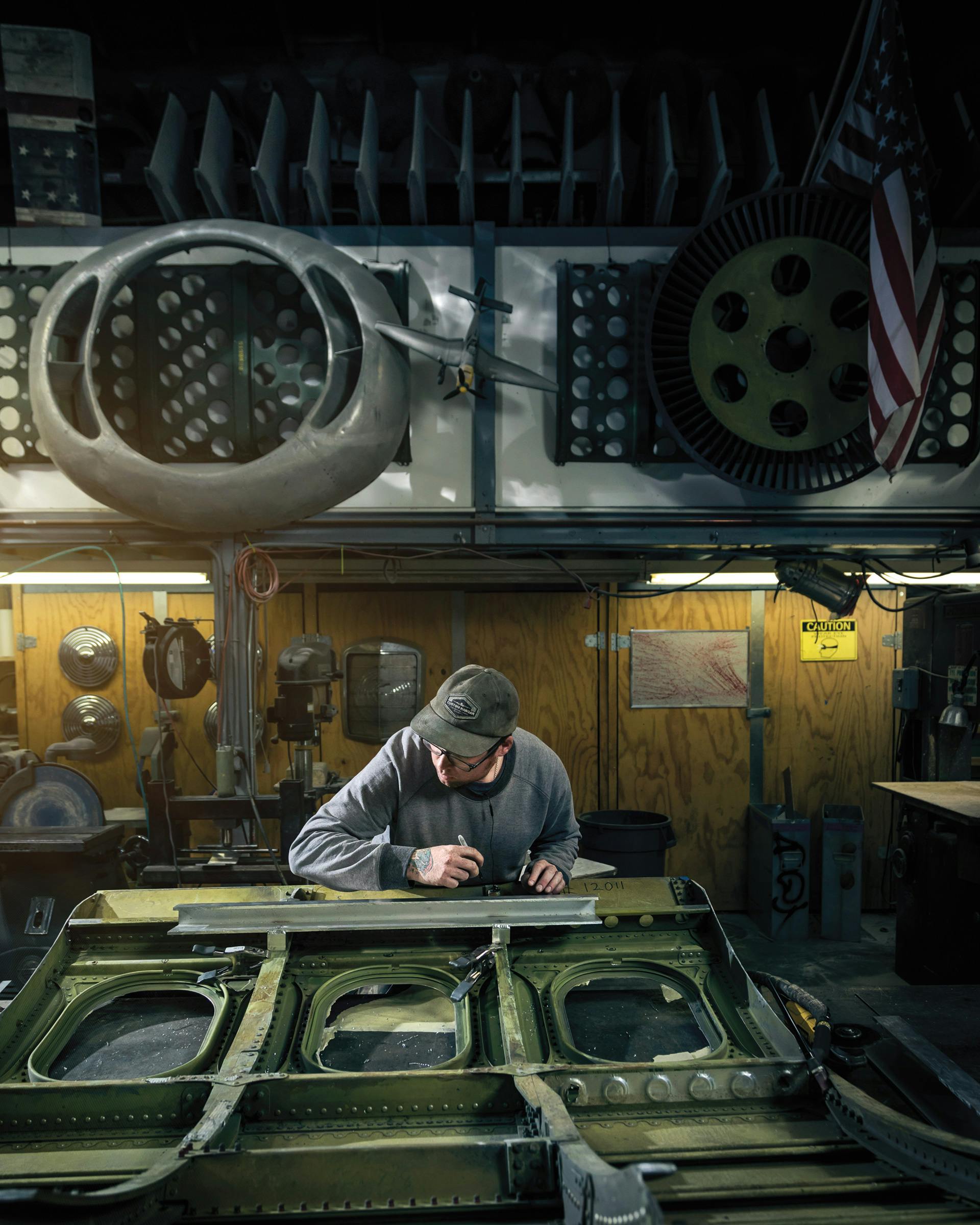
Cruise Control
“We’ve hardly advertised at all,” says Dave. “When we first started, people wouldn’t give us the time of day.” Today MotoArt has more than 150 designs and has snagged editorial coverage in more than 500 publications such as Maxim, Wired, Robb Report, Architectural Digest, Yachting, Men’s Journal and Luxe.
They specialize in custom projects such as a massive, L-shaped bar made from a fuselage with a price tag of $60,000. The company (and its art) has also received its share of onscreen appearances in films such as Magic Mike and Magic Mike XXL and on Discovery Channel in an eight-show series called Wing Nuts in 2004. The Jumbo Jet conference table is also being featured in Ripley’s Believe It Or Not!
A little more than a year ago, Dave inadvertently began another line when he made himself a laser-etched luggage tag cut from the skin of an old aircraft, and also began making mirrors from old fuselages (replacing the windows with glass.) That single tag, aptly named Plane Tags (from $20-$85; planetags.com), launched a frenzy for small-scale items (think an F-86 Sabre and an old H-21B that got ditched in the Atlantic and provided by the Pima Air Museum) and an affordable option for people who still want a piece of aviation history.
Dave, a father of two children, confesses he still loves coming to work and gets in at 5 a.m. every morning to get a head start on the rest of the crew. “I think it gets back to making the impressions and hearing people’s stories … and being able to connect to people in a more emotional way.”
“You don’t have to be an airplane nut to enjoy what we do,” he adds. “It’s the people who don’t fly and the people who have always wanted to fly. And everyone has their favorites.”
Visit MotoArt in person at 119 Standard Street in El Segundo. 310-375-4531, motoart.com







